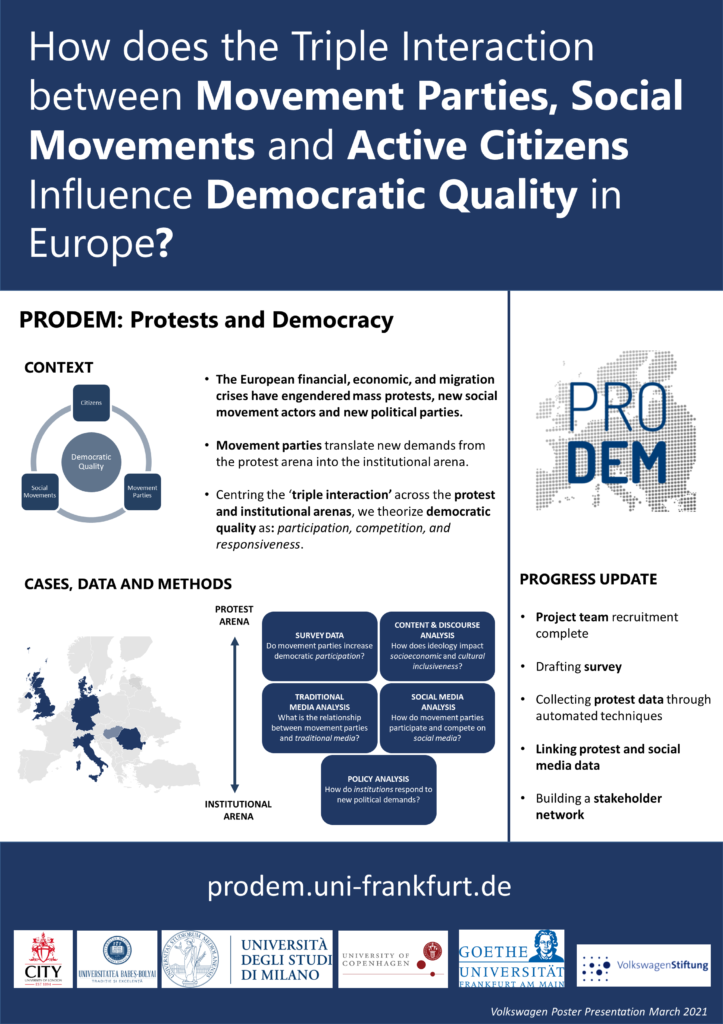“The Influence of Movement Parties on Democratic Quality”
On 3 September 2021, a panel was chaired by ProDem scholars Fred Paxton and Lorenzo Mosca (University of Milan) at the ECPR General Conference. Martin Brusis (Babeş-Bolyai University) kindly agreed to be the panel discussant. The full description of the panel can be found below, along with the abstracts of the papers presented.
This panel considers the shifting terrain of contemporary democratic politics. Over the course of the past decade, a wave of popular discontent swept across much of the world, stoked by the financial crisis, the ensuing austerity and deep disenchantment with political institutions in both liberal democracies and autocracies. Social movements channeled and articulated aspirations for greater democratic accountability and participation, more equitable economic policies, greater concern for social welfare and climate change. Against a secular decline in party membership, voter turnout and institutional trust, movements have rekindled a participatory imaginary challenging the status quo of many democratic countries. Criticized for a supposed inability to enact the political and social change they advocated, social movements were harbingers of a new political vehicle, the movement party. The rise and electoral success of party movements—from Podemos in Spain, to the Movimento Cinque Stelle in Italy, Jobbik in Hungary, Momentum in the UK or La Republique en Marche in France—captured aspirations for progressive change as well as anger and anxieties about globalisation, migration and the socio-economic and cultural upheaval that such processes have wrought. Occupying the breadth of the ideological spectrum—from the far right to the radical left—these movements put forward a radical criticism of political or media institutions, advocating participatory as well as populist reformulations of notions of citizenship, civic practices and organisational structures. Against the odds, they have scaled up, endured and have the potential to become entrenched despite the initially limited resources available to them. Notwithstanding their ideological differences, digital media appear to have provided important opportunities for the emergence of techno-populist ‘connective’ movements and parties in media systems largely unfavourable to them, thereby posing renewed challenges to incumbents. Recently, though, governments’ efforts to stop the spread of Covid-19 disease have drastically reduced the space for unconventional political actions, also affecting the linkages between movement parties and civil society.
The panel brings together scholars and other informed observers to present papers discussing how over the last decade, social movements, party movements and other collective actors have learn and develop new or overhaul existing participatory cultures; congeal competitive political agendas that challenge established political positions; rekindle trust and even faith in political leadership and democratic governance; (re)shaped (un)conventional citizenship norms, practices and action repertoires. Considering the above, the panel will grapple with such questions as: what does the existence of social and/or party movements mean for democracy? What are the consequences of their rise for representative democracy? What implications have their ideological leanings on democratic quality? How does their digital media use bear on their forms of action, organisational structures and cultures or their relationship with the media? How the pandemic has affected their evolution as well as their linkages with civil society?
Papers presented:
| From protests to institutions: Exploring how social movements, m ovement parties and citizens affect democratic quality | View Paper Details |
| The Mobilisation of a Conservative Movement in Romania: The Case of AUR | View Paper Details |
| Just call me movement: Party (re-)branding in Europe | View Paper Details |
| An illiberal tango in the protest arena? The role of grassroots mobilisation in democratic erosion | View Paper Details |
| Populism in Power: Can flatmates change each other ? The Italian case. | View Paper Details |
